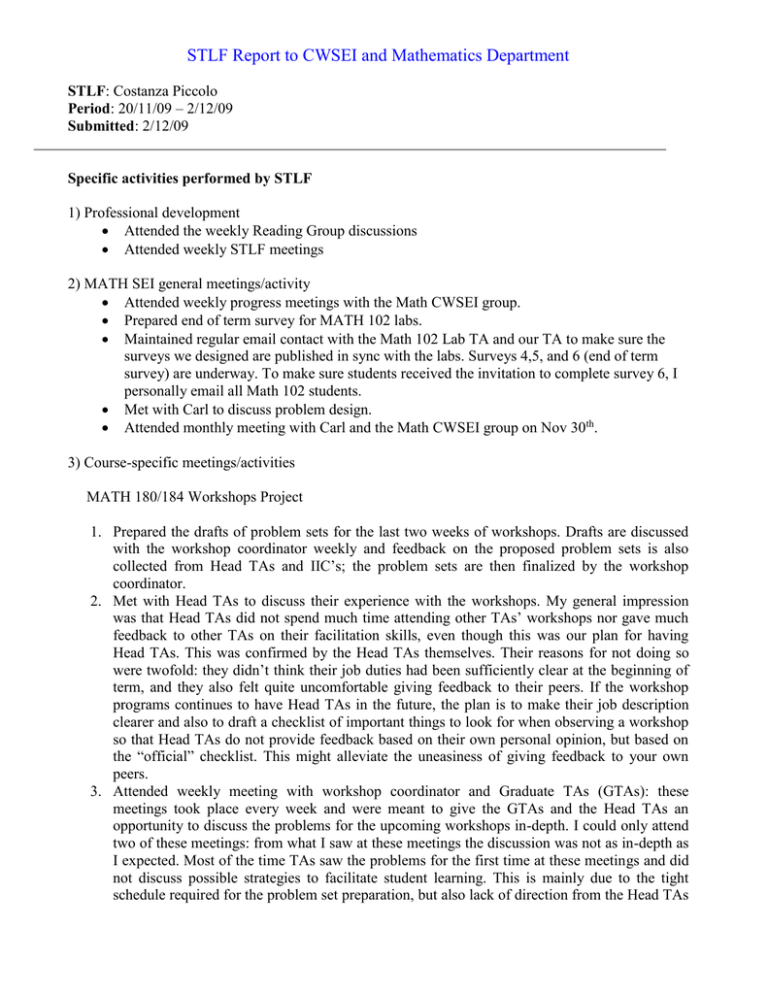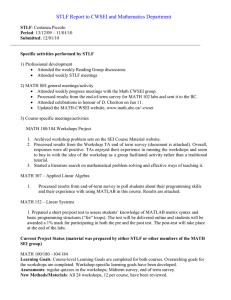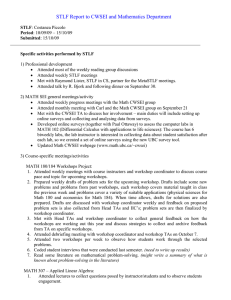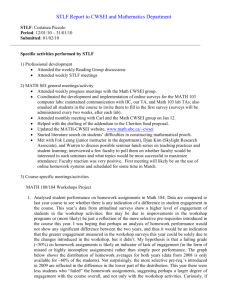STLF Report to CWSEI and Mathematics Department
advertisement

STLF Report to CWSEI and Mathematics Department STLF: Costanza Piccolo Period: 20/11/09 – 2/12/09 Submitted: 2/12/09 Specific activities performed by STLF 1) Professional development Attended the weekly Reading Group discussions Attended weekly STLF meetings 2) MATH SEI general meetings/activity Attended weekly progress meetings with the Math CWSEI group. Prepared end of term survey for MATH 102 labs. Maintained regular email contact with the Math 102 Lab TA and our TA to make sure the surveys we designed are published in sync with the labs. Surveys 4,5, and 6 (end of term survey) are underway. To make sure students received the invitation to complete survey 6, I personally email all Math 102 students. Met with Carl to discuss problem design. Attended monthly meeting with Carl and the Math CWSEI group on Nov 30th. 3) Course-specific meetings/activities MATH 180/184 Workshops Project 1. Prepared the drafts of problem sets for the last two weeks of workshops. Drafts are discussed with the workshop coordinator weekly and feedback on the proposed problem sets is also collected from Head TAs and IIC’s; the problem sets are then finalized by the workshop coordinator. 2. Met with Head TAs to discuss their experience with the workshops. My general impression was that Head TAs did not spend much time attending other TAs’ workshops nor gave much feedback to other TAs on their facilitation skills, even though this was our plan for having Head TAs. This was confirmed by the Head TAs themselves. Their reasons for not doing so were twofold: they didn’t think their job duties had been sufficiently clear at the beginning of term, and they also felt quite uncomfortable giving feedback to their peers. If the workshop programs continues to have Head TAs in the future, the plan is to make their job description clearer and also to draft a checklist of important things to look for when observing a workshop so that Head TAs do not provide feedback based on their own personal opinion, but based on the “official” checklist. This might alleviate the uneasiness of giving feedback to your own peers. 3. Attended weekly meeting with workshop coordinator and Graduate TAs (GTAs): these meetings took place every week and were meant to give the GTAs and the Head TAs an opportunity to discuss the problems for the upcoming workshops in-depth. I could only attend two of these meetings: from what I saw at these meetings the discussion was not as in-depth as I expected. Most of the time TAs saw the problems for the first time at these meetings and did not discuss possible strategies to facilitate student learning. This is mainly due to the tight schedule required for the problem set preparation, but also lack of direction from the Head TAs (I am not sure they were really told what they were supposed to do at these meetings). I plan to revise the workshop problems to also include some reflective points for the TAs. 4. Prepared and collected end-of-term survey. Partial results are attached. 5. Prepared online survey for workshop TAs to collect their opinion about the workshop program. Survey is underway. MATH 307 – Applied Linear Algebra 1. 2. Attended lectures to collect questions posed by instructor/students and observe students engagement; Met with R. Froese, IIC, to discuss class observations Prepared final online survey to poll students about their programming skills and their experience with using MATLAB in this course. Survey is underway. MATH 152 – Linear Systems 1. Met with course IIC (Brian Wetton) to discuss technical issues about the computer labs. Last year we identified the need for a more comprehensive orientation meeting with all lab TAs at the beginning of the term, and also the preparation of some documentation for the students on how to start the software on the lab computers. This year a lab Head TA has been hired to help with these two tasks. Brian also agreed to run pre and post tests to measure the programming skills on students. These will be short online tests the students will take on the first week of the course (possibly during the first lab) and then again at the end of the course (depending on the length of lab 7, the post test can be given directly in the lab itself, or depending on the type of questions it may be as part of the final exam, details to be defined). Brian has also agreed to include regular MATLAB assignments in the homework, especially if STLF will help with writing up these assignments. Current Project Status (material was prepared by either STLF or other members of the MATH SEI group) MATH 100/180 –104/184 Learning Goals: Course-level Learning Goals are completed for both courses. Overarching goals for the workshops are completed. Workshop-specific learning goals have been developed. Assessments: regular quizzes in the workshops; Midterm survey, end of term survey. New Methods/Materials: 12 workshops have been reviewed so far. MATH 257/316 Learning Goals: First draft of topic-level learning goals has been started. Assessments: none New Methods/Materials: none MATH 307 Learning Goals: Topic-level learning goals have been reviewed (Chapter 1 and 2 are completed) Assessments: Online surveys New Methods/Materials: Lecture Notes continue to be updated. Plan for immediate future work MATH 180/184 Workshops: 1. review workshop problem sets to improve quality of problems and archive material on the SEI Material website. 2. Continue the literature search on group work and problem-solving; prepare summary of main ideas available in the literature on mathematical problem solving. 3. Contact students with low workshop attendance to ask them why they are choosing not to attend. 4. Write up results of student interviews that were conducted last semester. 5. Survey workshop TAs to collect information about their experience with the workshops, this may help with the design of a better TA training protocol for next year. MATH 257/316 1. Work with instructor to complete topic-level learning goals for the course. 2. Archive Excel tutorials on CWSEI archive (This was actually done by the instructor last year). MATH 307 1. Complete review of lecture notes and topic-level learning goals (Chapter 3 and 4); 2. Prepare more assessment tools (lists of questions that can be asked in class, challenging homework assignments, online pre-reading quizzes and surveys); 3. Continue to assess course material (assignments, exam questions, lecture notes) to make sure it matches course learning goals; 4. Organize and archive questions collected during lectures.


